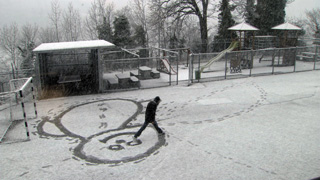The Fortress
La Forteresse SWITZERLAND / 2008 / French, Others / Color / 35mm (1:1.85) / 105 min
SWITZERLAND / 2008 / French, Others / Color / 35mm (1:1.85) / 105 min
Director, Producer: Fernand Melgar
Photography: Camille Cottagnoud
Sound: Marc Von Stürler
Editing: Karine Sudan
Script, Editing Collaboration: Claude Muret
Production Company: Climage World
Sales: Accent Films International www.accent-films.com
A Swiss refugee reception center where people seeking asylum are temporarily detained until the authorities reach a decision. The Fortress shows people who have left their homelands around the world for various reasons and have arrived here seeking a place to live, and the staff who review whether they should be admitted or not. We observe the small exchanges that take place at the center. The reality of the refugee problem is thrown into relief through the continuous gaze upon a place where “screening” occurs as a matter of routine.
[Director’s Statement] The right of asylum is a cornerstone of the humanitarian tradition of Switzerland, the heritage of its political neutrality. Throughout the course of its long history, Switzerland has been a preferred destination for refugees of all origins and political and religious persuasions. The Geneva Convention, the basis of the Swiss policy, states that no one may be sent back to a country where their life or freedom is threatened, or they face the risk of degrading punishment or torture.
Yet the recent approval of one of the most restrictive laws in Europe may signal the end of this humanitarian tradition. From a humanitarian Noah’s Ark, it seems that we have returned to the dark hours of the last world war, when a government leader justified closing the door on the Jews with these words: “The boat is full.”
Under the new legislation, the migrant is seen mainly as a threat, a troublemaker, or a profiteer. Barriers are raised, either by forbidding immigration to those outside of the European Union (i.e., 95% of the world!), or by making access to asylum a mirage. If, despite everything, a foreigner manages to cross the border, regardless of his status, everything will be done to make him feel that he is and will remain a second-class citizen.
I wanted to understand what has heightened the fear of the other in this country, what has pushed us to transform a land of asylum into an impregnable fortress. I focused my attention on a very strategic site: a federal reception center, for it is here, in this airlock for refugees, that the asylum seeker’s fate hangs in the balance. Here the triage takes place, the decision is made. After two interviews, federal officials will determine whether the asylum seeker can stay or must leave.
 Fernand Melgar
Fernand Melgar
Born into a family of Spanish unionists exiled to Tangiers. His parents smuggled him in with them when, in 1963, they emigrated to Switzerland as seasonal laborers. In the early ’80s, he cut short his business studies to establish, with several friends, Le Cabaret Orwell in Lausanne, soon a mecca for French-speaking Switzerland’s underground culture. After endowing the nightspot with a program of creative videos, he became a self-taught, freelance film director and producer. In 1983, he began putting together experimental films and iconoclastic reportages for television. In 1985 he joined Climage, a collective to which he still belongs and under whose auspices he has completed around a dozen documentaries, now considered benchmarks on the topics of immigration and identity. His previous documentary, Exit: The Right to Die (2005), garnered several international awards, including the prestigious EBU Golden Link Award for the Best European Co-Production and the Swiss Film Prize. Winner of the screenplay competition launched by Télévision Suisse Romande in 2007, Melgar is currently working on his first fiction feature film, Far Behind the Mountain. He lives and works in Lausanne. |
